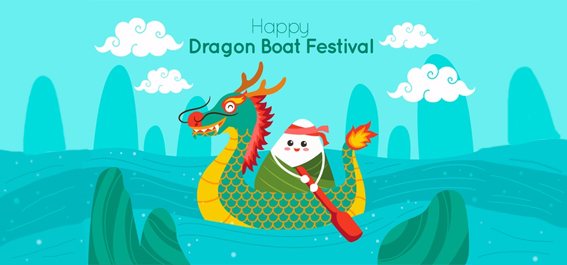Dragon Boat Festival
The Dragon Boat Festival (traditional Chinese: 端午節; simplified Chinese: 端午节) is a traditional holiday originating in China, occurring near the summer solstice. The festival now occurs on the 5th day of the 5th month of the traditional Chinese calendar, which is the source of the festival's alternative name, the Double Fifth Festival.[1] The Chinese calendar is lunisolar, so the date of the festival varies from year to year on the Gregorian calendar. In 2017, it occurred on 29 May; in 2018, on 18 June; in 2019, on 7 June; and in 2020, on 25 June.

The English language name for the holiday, "Dragon Boat Festival", possibly translates into two alternative Chinese names for the holiday, 龍船節 (Lóngchuánjié) and 龍舟節 (Lóngzhōujié).
The Chinese name of the festival is "端午節" (simplified Chinese: 端午节; traditional Chinese: 端午節; pinyin: Duānwǔjié) on the mainland,[2] Taiwan, and "Tuen Ng Festival" for [3] Hong Kong, Macao,[4] Malaysia and Singapore.[5] It is pronounced variously in different Chinese languages. In Mandarin, it is romanized as Duānwǔjié on the mainland and Taiwan; in Cantonese, it is romanized as Tuen1 Ng5 Jit3 on Hong Kong and Tung1 Ng5 Jit3 on Macao. All of these names (lit. "Opening the Fifth") refer to its original position as the first fifth-day (午日, Wǔrì) in the fifth month (五月, Wǔyuè) of the traditional Chinese calendar, which was also known as 午 (Wǔ). People's Republic of China use "Dragon Boat Festival" as the official English translation of the holiday,[6][7] while Hong Kong calls it the "Tuen Ng Festival"[5] and Macao calls it "Dragon Boat Festival (Tun Ng)" in English[8] and Festividade do Barco-Dragão (Tung Ng) in Portuguese.[9]
Among Malaysian, Singaporean, and Taiwanese Hokkien speakers, the festival is also known as the "Fifth Month Festival," the "Fifth Day Festival," and the "Dumpling Festival."
In Korea, the holiday is called Dano. It is a significant traditional holiday in Korean Culture. In North Korea it is an official holiday.
In Indonesian, the festival is known as "Peh Cun", which is derived from Hokkien (扒船; pê-chûn).
The festival was long marked as a cultural festival in China and is a public holiday in the mainland, Hong Kong, Macau, and Taiwan. The People's Republic of China government established in 1949 did not initially recognize Duanwu as a public holiday, but re-introduced it in 2008 alongside two other pre-Communist festivals in a bid to boost traditional culture.[15][16]
It is unofficially observed by the Chinese communities of Southeast Asia, including Singapore and Malaysia. Equivalent and related official festivals include the Korean Dano, Japanese Children's Day, and Vietnamese Tết Đoan Ngọ.
Happy Dragon Boat Festival!
